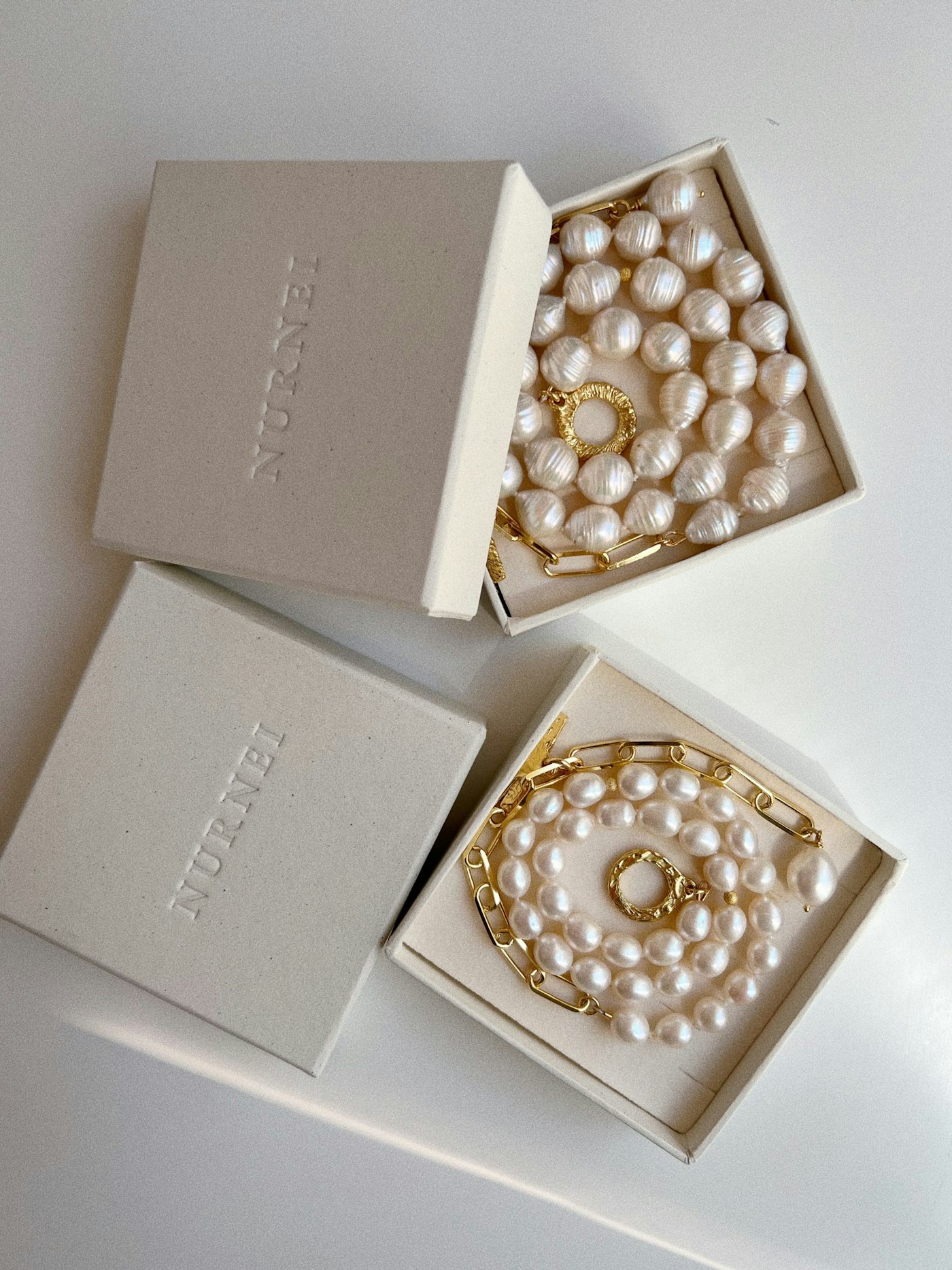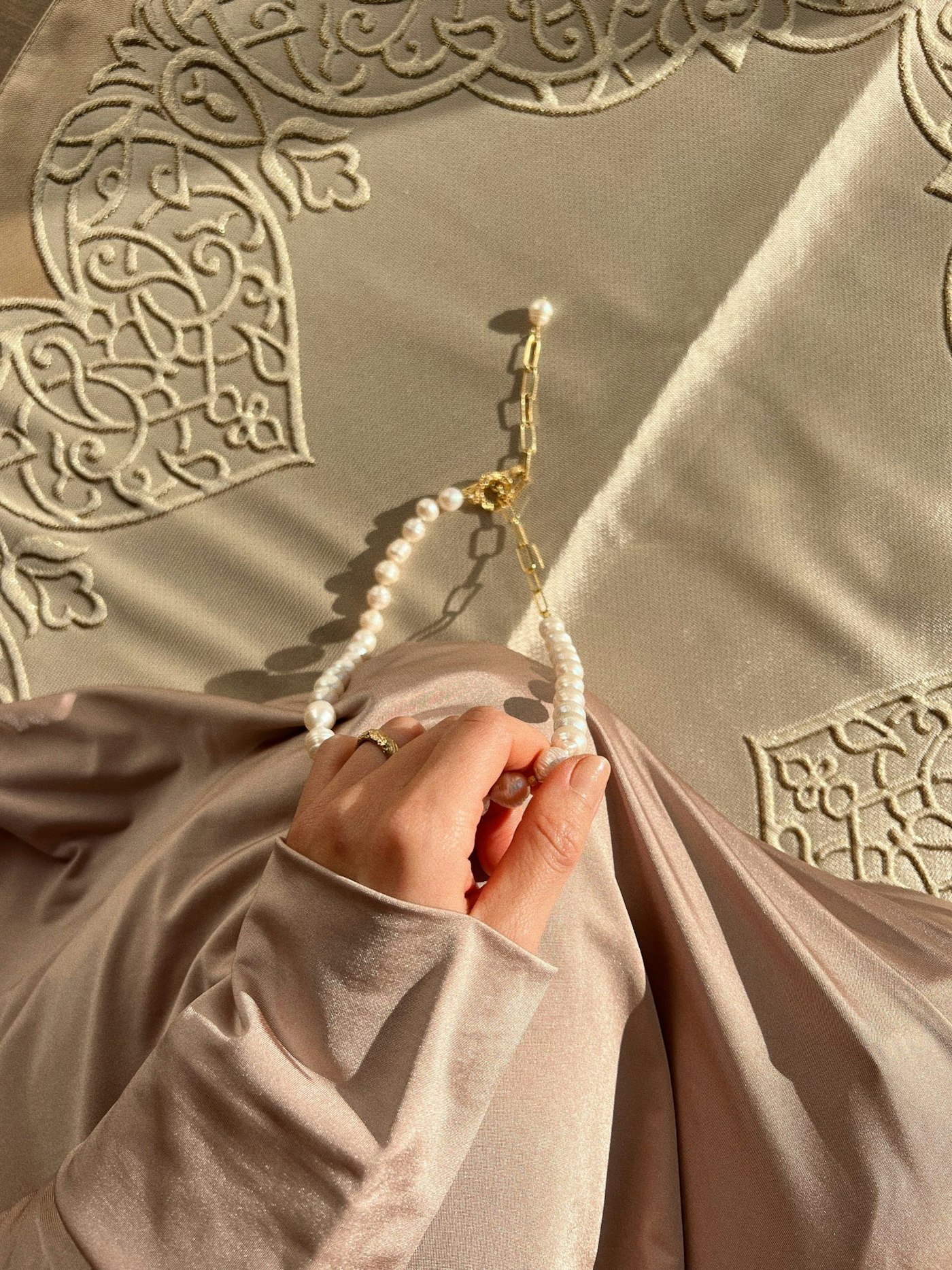In Conversation With Sustainable Jewellery Brand NURNEI: “Environmental Impacts of Overproduction Are Changing the Way We Think and Produce”
by Jenan Ashi in Careers on 13th April, 2023

NURNEI is a jewellery brand based in Kavala, Greece. Founded in 2019 by Noor. Her namesake brand embraces natural materials, inspirations from the sea, her Palestinian heritage, and in her latest collection, her faith. With each collection she studies a new aspect of her journey in ruminations on nature, geology, and living in Greece.
Her latest collection features two 33 pearl necklaces which were designed with Muslim women in mind. They serve the function of prayer beads when unclasped, creating a multifunctional piece of jewellery that reimagines the classic string of pearls.

Where does your passion for design come from, and does your academic background in Geology play a part in it?
Nature inspires design, and I’ve always had an affinity for it, from anything botanical to shells and pearls. When choosing pearls, I prefer imperfect pieces, as opposed to the perfectly spherical ones, which are so sought after and deemed more valuable. Their organic shape and unique iridescence make the pearls more beautiful. Similarly, I prefer to use shells that are organic and textured which can appear abstract to the eye.
That love for nature led me to study Geology and then go on to attain a masters in Geochemistry, where I focused on how oysters are impacted by ocean acidification and climate change. I would say that’s what sparked my interest in minerals (aka gemstones) after learning about their structures and properties in an academic setting. After I finished my studies in Scotland, I relocated to Greece with a career in science research in mind. Moving to a small slow paced city, I found I had a lot of spare time and I was just living, and living creatively at that.
I’ve always lived somewhat creatively, I love painting, drawing, textiles, my grandma taught me to knit and more recently I learned how to crochet. Jewellery making was always a hobby of mine too. I had built a collection of glass beads and crystals from which I’d make gifts for family and friends. At the time, I had invested in gemstone beads and faceted stones with the intention to make jewellery in my spare time, and learn the art of silversmithing.
Does being based in Greece influence how you approach your work and its sustainability?
Definitely. I met a local jeweller in the town centre and I expressed my interest in visiting their workshop. He’d called his father who runs the workshop [where our jewellery is handmade] on the spot and the very next day I visited. Coming from London, I was surprised at their openness and ease to let a stranger walk into their workshop, but the nature of the people here is to really nurture a genuine interest. Nikos was taught jewellery making by his father, and his father by his father, so it’s a generational craft. At first I would go in to observe the team at work, and to socialise. Whilst the jewellers worked, we’d chat about what they’re doing, using each task as a teaching moment for me. We also spoke over lunch, getting to know each other – they’d teach me how to speak Greek and we’d bounce back and forth, sharing anecdotes from Greek, British, and Arab culture.
Generally, I found the work life balance here in Greece just right, and that balance goes hand in hand with me, personally, and NURNEI. It encouraged taking a natural slow pace and creating when inspired, and not just from the urge to keep up with the fast paced world we live in.
At the workshop, they have one person dedicated to repairs. That’s something that really fascinated me, the concept that in Greece everything gets repaired. Some incredibly unassuming pieces would come into the workshop, and you’d just think ‘why on earth is someone bringing that in to be repaired?’. But I’ve learned that the people here don’t just keep things of monetary value, but because they’re sentimental to them. I’d watch these pieces be repaired and restored to their original beauty, which was such a wonderful process to observe.

So things came full circle, and I found myself coming back to what fascinated me…art and making things with my hands. Having understood the process of casting and jewellery making I launched NURNEI. I learned first hand, in the workshop, how your jewellery can be recycled instead of discarded, or it can be restored, or if it’s gold plated sterling silver like ours, it can always be replated. I tell my customers that if anything starts to fade over a few years, they should pop into their local jeweller and have it cleaned or replated. Sending it back to me would mean needless shipping which isn’t environmentally friendly, not to mention the extra cost. By sending it to their local jeweller, they would support a local business too. I try to work with intention, it’s not about exclusivity.
As I move forward I’m incorporating all I’ve learned through my professional career into thinking sustainably and ethically in NURNEI. Depleting resources and environmental impacts of overproduction are changing the way we think and produce. I’m trying to be mindful of that and what we use and how we use it, so we produce only when we get orders, and we recycle silver which is an inevitable byproduct in jewellery making.
Do the natural motifs in your design have any correlation to your faith?
When I look at things that are bigger and greater than me, that’s when I feel most humbled. That’s when all my worries melt away. Allah created all this beauty around us, and I feel I should just sit and appreciate that beauty. They say when you’re not feeling your best you should go outside and look to nature, because it has relieving and healing properties. That goes hand in hand with my faith, and practice of Tafakkur, ruminating on Allah’s beautiful creation. There’s a sense of calm and fulfilment in being surrounded by the natural elements in my work, or in my knowledge of geology and how everything is interconnected. By translating that into wearable art, I am perhaps allowing others to experience that appreciation of nature with me.

That’s why Kavala is so heavily featured in my work, it allows me to set the scene. Being immersed in nature here, the sea, the mountains, in a slow city with an organic culture, is what made the brand take shape. When I came here, it was as if the puzzle pieces fit together. In Kavala I’m able to simply take a walk and be inspired. I’m so in tune with the environment, and I adore seasonality. I feel grateful that I get to experience this way of life and share it through NURNEI.
After some time in jewellery design, I wanted to make something significant. I really questioned what I was working towards. Initially, I wanted to remain anonymous as the designer behind the brand, to keep the focus on the designs, but eventually I realised that pretty much all of the jewellery and inspiration is very connected to me which felt important to share because it placed meaning in the jewellery. This, hopefully, would allow others to relate, or build their own connections to the pieces too. I’d previously worried that perhaps my audience wouldn’t respond well to pieces that catered to my religion, especially if they followed along for a different reason. These were all boundaries I’d imposed on myself. After releasing the Special Collection, the reception was great. I was glad to have been so intentional with it. It really reaffirmed to me that trying to hide yourself as a muslim woman can be incredibly limiting. When you detach and let go of the confines you’ve made, you can create with greater purpose.

Could you tell us about the Special Collection and what makes it live up to its name?
Jewellery is wearable art, and even when it’s not worn, it’s often displayed as a decorative feature. Pearls in particular have always had a lofty status, they were the original gemstone. Their history and how they form naturally from an oyster that’s irritated by a grain of sand, then transformed into a beautiful iridescent shape says it all. Using pearls with a Masbaha provides an elevated experience, and it’s somewhat symbolic using this beautiful valuable material in the process of Dhikr (Remembrance). There’s so much reward in Dhikr which is reflected in the intentional use of pearls in this collection. It was also inspired by my grandmother’s pearl Masbaha, she had a 99 piece one and I wanted to make something like it but by modernising it. That’s when I designed the Pearl Prayer Bead Necklace, combining jewellery with functionality.

How would a Muslim woman go about appreciating and using a necklace from this collection to the fullest?
In our day to day lives, we often forget Dhikr. So these pieces were very intentional in being wearable, as well as serve as a visual reminder – you can take off the necklace and use it. The toggle clasp, for example, was designed due to its ease of use. The precious materials in this piece were also meant to be in alignment with the grandeur of making remembrance and how valuable it is to us as Muslims.
In the Quran we are told, ‘Surely in the remembrance of Allah do hearts find comfort.’ (Qur’an 13:28).
In a day where we have all sorts of technology, and even clickers for Dhikr, having something physical in your hand and natural in its composition, that you have to be mindful with, doesn’t go amiss. The action of using prayer beads gives you a physical connection whilst Dhikr gives you a spiritual connection, reminding you to slow down, just like prayer does.

In the jewellery sector, we don’t really have anything tailored to muslim women. I especially get hijab wearing women requesting longer pieces that can be seen with hijab, of course everyone has their own way of wearing it, but this piece does cater to that. It’s been quite nice to be able to do that. The Pearl Prayer Bead Necklace is intended to be worn daily and used as a Masbaha. I designed it with versatility in mind so that it can be styled casually on a day-to-day basis and elevated with an evening look.
Jenan Ashi
Jenan is a food writer, recipe developer & translator based in Wales. Her interests include promoting and pondering mindful, and sustainable living. She is also eager to shine a spotlight on the talents of others in creative industries.